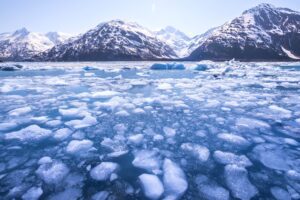From Exploration to Science: Innovative Technology and Environmental Conservation
Penguin Watch, Dahua Technology and Oxford University among organisations deploying advanced camera technologies in Antarctica
Latest camera technologies allow scientists to study threatened species and extreme environments
Antarctic region a crucial barometer of climate change
New research published last week reveals that Antarctica’s melting ice sheet could decrease much faster than previously thought.
By analysing markings on the seafloor off Norway, a group of scientists have proved that ice sheets can collapse into the ocean in spurts of up to 600 metres a day, about 20 times faster than the speediest retreat ever recorded.
With ice losses from Antarctica caused by climate change having already pushed up the surface of the world’s oceans by nearly one centimetre since the 1990s, these results provide yet another example of unanticipated ways that our greenhouse gas emissions are affecting the world.
However, the most terrifying aspect of it all, is the fact that life on earth is dependent on the way water moves through it. Any changes can have devastating repercussions, including food chain disruptions, drastic weather changes, and an unbalanced ocean and wildlife.
Raising awareness about the urgent need for action to mitigate the evolving climate crisis, these developments have shed light upon the importance of uncovering new evidence-based trends and findings.
Antarctica is one of the most remote and inhospitable regions and historically, the majority of Antarctic science has taken place on national expeditions, whose primary objective was not science, but exploration.
Yet, new technology is opening the door to studies and research that were once impossible or highly impractical.
Scientific research bases facing harsh weather conditions and limited resources, have begun employing tools such as security cameras as means of providing extensive coverage and live footage of wildlife, and environmental monitoring.
As an example, in 2012, a joint venture between the Zoological Society of London and Oxford University, saw scientists placing 16 hidden cameras around Antarctica and the sub-Antarctic Island of South Georgia to gather information about the breeding patterns of gentoo (Pygoscelis papua) and king penguins (Aptenodytes patagonicus) during the winter.
Similarly, conservation project Penguin Watch, collects and analyses data to investigate how penguin populations respond to threats like climate change and fishing activity. Remote-sensing cameras generating up to 500,000 images a year and new technologies, are allowing Oxford University scientists to gather this vital data remotely. Feeding into instruments such as the Antarctic Treaty, the data collected additionally helps policy makers develop effective protection measures.
Following Penguin Watch’s success, the team is helping researchers worldwide monitor other species including seals in Hawaii and bears in the Canadian Arctic.
Beyond contributing to wildlife conservation, security cameras can also be used to facilitate project development and scientific research.
The Marambio Base on Seymour Island has in the last few years recorded a continuous increase in average temperatures, with scientists describing the new records as ‘incredible and abnormal’.
In an attempt to integrate digital intelligence into the region’s protection, Dahua Technology donated in 2022, 15 security cameras to scientific bases in the Argentine region of Antarctica. This allowed for an improved connectivity with the central base, paving the way for deeper understanding of scientific research in the area.
With temperatures rising rapidly, the use of cameras is expected to safeguard the region and by default, 70% of the world’s fresh water held in the form of snow and ice.
Ultimately, the new research on the melting ice sheet in Antarctica is a concerning development that highlights the urgent need for action to mitigate the evolving climate crisis. The speed at which the ice sheets can collapse into the ocean is much faster than previously thought, and this has far-reaching consequences for life on earth.
Embracing these innovative conservation techniques is critical to ensuring we can adapt against an unpredictable future, providing new opportunities for researchers to better understand the changes occurring in the region. By continuing to invest in new technology, we can gain a deeper understanding of the impact of climate change on our planet and work towards finding effective solutions to protect it.
Read more:
From Exploration to Science: Innovative Technology and Environmental Conservation


























